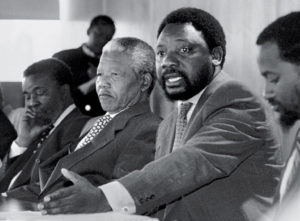In the run-up to the ANC’s Polokwane conference in 2007, controversial cartoonist Zapiro published a lasting depiction of Cyril Ramaphosa.
Ramaphosa is on a race track. Kader Asmal, an outspoken ANC MP who had served in Cabinet, is shouting on the sidelines. He is urging Ramaphosa to run.
To Asmal’s disappointment, the businessman is wavering. His legs – or is it the lack of fire in the belly – fails him. He doesn’t take off.
Asmal, who was a member of the party’s national executive committee, tried in vain to avert a terrible leadership battle between Thabo Mbeki and Jacob Zuma.
He influenced his branch in Cape Town to nominate Ramaphosa to stand as president of the ANC. But Ramaphosa, who had a reputation as skilled negotiator and presided over the drafting of the country’s constitution, wouldn’t run.
It was almost as if Ramaphosa didn’t want to dirty himself by entering a muddy leadership race. There was always the prospect of losing. And with it the danger of sullying a clean image that had earned him millions of rands in business.
Asmal’s body language at the Polokwane conference exhibited total dejection. When Tokyo Sexwale, the only “third way” candidate, rose to the podium to suddenly make a statement in support of Zuma, I saw Asmal banging his table.
Concerned about the parlous state of his organisation, Asmal died most likely a broken man in 2011.
At the 2012 conference in Mangaung, Ramaphosa could have run for the top job. Instead, he emerged as a second-choice candidate to deputise for Zuma.
The Zuma camp had preferred Kgalema Motlanthe to continue as deputy president to prevent him from challenging Zuma, but Motlanthe rejected them.
Who would have imagined that “Mr Constitution” Ramaphosa, a leader with a near-impeccable record as a strategist and a negotiator, would settle for leadership crumbs? Why didn’t he challenge for the top position?
Before he accepted the Mangaung crumbs, the Marikana massacre exposed Ramaphosa as a partial leader who put his reputation in harm’s way.
In the controversial e-mails submitted to the Marikana Commission of Inquiry, he pushed for “concomitant” action against mine workers accused of violent crimes.
What had happened to the Ramaphosa the skilled negotiator with the capacity to bring warring factions into the table? Why didn’t he advocate for the resolution of the conflict in a constructive, peaceful manner?
At the Marikana Commission of Inquiry, Ramaphosa, now deputy president, submitted that he was appalled by the Marikana horror stories he had heard. His “concomitant” reaction in those e-mail was meant to stop the further loss of lives.
Well, his detractors have reached different conclusions, saying he was responsible for precipitating the subsequent killing of 34 miners, even though the judicial inquiry cleared him of wrong doing.
Whatever the conflicting views about his role as a board member of Lonmin, what is certain is that Ramaphosa didn’t use his experience as a negotiator and peacemaker to calm the situation. He didn’t rise to occasion.
When Cosatu was teetering on the brink of collapse, Ramaphosa was deployed by the ANC to help resolve the differences between the factions led by the federation’s president Sdumo Dlamini and general secretary Zwelinzima Vavi. Ramaphosa failed.
The result was a rudderless Cosatu outclassed by ultra-conservative union Solidarity in the fight for freedom of speech and worker rights at the SABC. A weak Cosatu is a contributing factor to the ANC’s declining electoral support
Long before the Cosatu split, Ramaphosa presided over a hearing that expelled Julius Malema and his lieutenants in the ANC Youth League. What had happened to Ramaphosa the negotiator who could bring warring parties to the table?
Following the Nkandla judgment, Ramaphosa had a godsend opportunity to show leadership by persuading Zuma to do the right thing.
Alternatively, he could have “walked ahead of the flock”, to borrow from Nelson Mandela’s leadership lessons, when the vote of no confidence motion was put before the National Assembly. But Ramaphosa failed to rise to the occasion.
As a constitutionalist, how does he sleep at night knowing that he deputises for the Constitution’s violator-in-chief within the state?
When he was accused by Zuma and Gupta media of having been captured by the likes of Johann Rupert, Ramaphosa could have used the spreading of lies against him as an opportunity to break ranks and provide alternative leadership. Alas, he was blind to the opportunity in front of him.
To his credit though, he intervened to reverse the disastrous appointment of Des Van Rooyen as finance minister.
Now that the ANC lost control of key metropolitan municipalities and Zuma has been fingered as the cause of the electoral casualties Ramaphosa should realise the party is crying out for fresh leadership and new direction. But he is still not rising to the occasion.
Unless Ramaphosa rethinks his political strategy – if he has one – there is a possibility that at best he will inherit a weak, ungovernable ANC. At worst he will have the rug pulled from under his feet.
He must remember that Kader Asmal, who represented the endangered rationalist class in the ANC, is no more.

